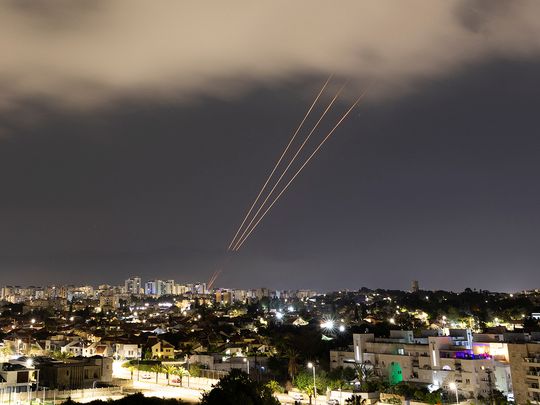
We are living through unprecedented times. The events of the past six months will undoubtedly go down in bold in the history of the Arab-Israeli conflict, just like the two Intifadas and the wars of 1948, 1967, and 1973. Only do game-changer events get mentioned in bold in history books, or horrific ones that whip up an extremely high death toll.
At the time of writing, the number of deaths in Gaza has neared 34,000, mostly civilians. This month has also witnessed two primers, starting with the Israeli targeting of the Iranian consulate in Damascus on 1 April, followed last Saturday by the Iranian drone attack on Israel.
Columbian President: Prelude to World War III
Iran sent over 300 projectiles to Israel, including 170 drones, 30 missiles, and 110 ballistic missiles. Israel claimed that 99% of them were intercepted and downed before reaching destination.
Israeli premier Benjamin Netanyahu is promising retaliation, while world leaders are calling on him to think twice before dragging the region into a full-fledge war. UN Secretary-General Antonio Guterres said that the region was “on the brink” of war while Columbian president Gustavo Petro described it as a “prelude to World War III.”
Truce proposals are presently on the table, although Hamas insists that it will reject anything less than a permanent ceasefire and the full withdrawal of Israeli troops from Gaza.
Within Israel, a response to Iran is not popular. Some fear that it would trigger another Iranian response, putting Israeli lives at risk. Others believe that it would distract from what really matters for Israel; the release of 130 hostages taken by Hamas on 7 October 2023. Presumably, 34 of them are already dead. Defence Minister Yoav Gallant is threatening a Phase III, saying that the confrontation with Iran “is not over yet.”
Israel vs Iran?
The Iranian attack caused no significant damage within Israel but marked an important development in the region, being the first time in history that the “Jewish State” is attacked directly by Iran.
When the Khomeini’s Revolution took place in 1979, its leaders closed down the Israeli embassy in Tehran and symbolically gave it to the Palestinians. Since then, they have fought Israel by proxy, mainly through Lebanon — never directly — never on a state-to-state level.
Both sides seemed to respect that undeclared rule, until Netanyahu took down the Iranian consulate building in Damascus earlier this month. It was a decision taken with no long-term vision, breaking all the undeclared rules of engagement and taking the entire region into an entirely new level of tension.
Little damage, more spectacle
The Iranian attack was not really planned to take down the state of Israel. The drones were announced nearly two hours in advance, killing any element of surprise and giving Israel and the US enough time to intercept them, given that the shortest distance from Iran to Israel is about 1,000km (620 miles) running across Iraq, Syria, and Jordan.
The ballistic missiles were fired nearly an hour before the slower drones, in order to reach Israel at the same time but that also gave the Israelis enough time to prepare for them. Four reached the Nevatim Air Force Base in the Negev Desert, but caused no serious damage.
Hidden message
What the attack wanted to say was: “We are capable of reaching your cities and towns — just like you are. Don’t go down this path. It’s too dangerous and spells out mutual destruction.” And that is what US president Joe Biden seemed to understand when according to the Axios, he told Netanyahu, right after the attack: “You got a win. Take the win.” Biden wanted the Israelis to treat it as a win, and stop at there without escalating further.
A deeper look shows that as gripping as it may be, the Iranian attack might actually trigger a conclusion to the Gaza War. Too much is at stake for everybody — even Joe Biden in an Election Year — should this war drag any longer. Iran can now accept a deal, given that it believes that it has proved its military merits by firing projectiles deep into Israeli territory. Israel can also claim the same, saying that it downed the drones, took down an entire consulate building in Damascus, and killed top Iranian generals.
A peace agreement
Its historically proven that countries at war can only de-escalate after proving their military prowess. Egypt and Israel didn’t start talking until Anwar al-Sadat staged the October War with Syria in 1973. Yasser Arafat didn’t sign Oslo Accords until after the first intifada while Israeli premier Yitzhak Rabin didn’t do it before waging three wars against the Arabs.
This doesn’t mean that Iran and Israel will reach a peace agreement anytime soon. Far from it, that seems impossible at present, both from a strategic and ideological standpoint. What it does mean is that the Iranian attack is indeed a win-win scenario for both countries, and gives them space to climb down in Gaza. Both can now tell their people: “We have scored a victory against our enemy. Let’s now give peace a chance.”
— Sami Moubayed is a historian and former Carnegie scholar. He is also author of the best-seller Under the Black Flag: At the frontier of the New Jihad.









